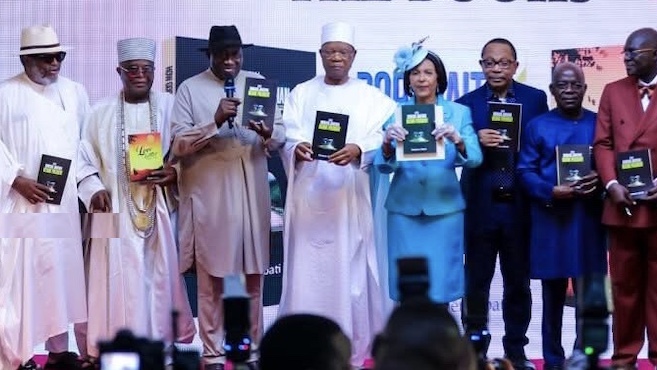Nigeria must reload to rediscover moral direction, says Bishop Kukah at Reuben Abati’s birthday
The Catholic Bishop of Sokoto Diocese, Matthew Kukah, has said Nigeria must “reload” itself to rediscover its moral direction and rebuild its national identity, lamenting the decline in shared ideals and values in the country.
Mr Kukah, a reverend, spoke on Friday at the Nigerian Institute of International Affairs (NIIA) in Lagos, during the 60th birthday celebration and book launch of journalist and ARISE News anchor, Reuben Abati.
Delivering his keynote address titled “Nigeria: Time to Reload,” Mr Kukah said Nigeria had become “a nation of disrupted dreams,” where moral and intellectual standards that once guided public life have waned with time.
Introducing his remarks, the cleric said that despite the accomplishments of Mr Abati and other journalists, the media’s professional standards have dropped over time.
“When I checked the records, I discovered that actually people like him and a lot of other people in the media, somehow, and please don’t get me wrong, the standards are falling, not due to lack of intellect, but due to age,” he said.
The event, which also marked the public presentation of Mr Abati’s three books: Portraits: People, Politics and Society; A Love Letter and Other Stories; and How Goodluck Jonathan Became President, was attended by dignitaries from politics, media, and academia.
Nigeria’s identity crisis
Reflecting on Nigeria’s identity crisis, Mr Kukah said the country had failed to build shared values that inspire unity.
“Many of you are familiar with the poem by Robert Frost, The Road Not Taken. It is evident that because we are taking so long to get to our destination, and because the goalposts are always constantly shifting, we must ask ourselves what has happened with map-reading. Why have we ended up with a nation of such disrupted dreams?” he said.
He compared Nigeria’s lack of national monuments with countries that had built identity through history and symbolism.
“I went to Alexandria in Egypt and was shocked by what I saw. Everything there is tied to tourism; they don’t have oil, yet everything works. I asked myself, if somebody came to Nigeria today, where would I take them? In other countries, tourists can visit the White House or the Elysee Palace, but in Nigeria, you cannot even see the Presidential Villa unless you are flying over it, and you could be shot down,” he said.
According to him, “The absence of such monuments reflects a deeper absence of national myths that help in nation building.”
“We need to reload because either we fired our shot wrongly, or the target moved, or something has gone wrong. How do we explain the over 60,000 abandoned projects across Nigeria? How do we explain the billions of dollars lost to illicit financial flows, as captured in Kofi Annan’s report?”
He lamented that religion, which should inspire peace and unity, had instead become a cause of division and death.
“We are victims and hostages in the womb of ethnicity and religion, things that should inspire us. Religion has become a subject of death. So, where did we get it wrong? Even the things we did right, we failed to consolidate,” he said.
Moral foundations
Mr Kukah criticised Nigeria’s failure to uphold a shared sense of national heroism.
The cleric also attributed Nigeria’s political instability to its colonial foundation. “Books such as The Harold Smith Story and A Fatherless People by Dele Ogun document how the British manipulated the political process and sidelined visionary leaders like Awolowo and Azikiwe because of their radical ideas,” he said.
“We are acting in a play we didn’t write, a play full of plots we are unprepared to deal with,” he added.
He concluded by urging Nigeria to “reload” its moral compass: “We need to reload to ask ourselves what is happening, what we are doing, and what we can do differently. Until we establish a moral foundation and a unifying national myth, Nigeria will continue to move without direction.”
Tributes to Abati
President Bola Tinubu, in a release issued yesterday, described Mr Abati as a “public intellectual, author, columnist, law graduate, and broadcaster” whose “insightful articles and television analyses continue to enlighten and inspire.”
Former President Olusegun Obasanjo and Goodluck Jonathan, also praised Mr Abati’s contributions to journalism, literature, and public service.
Mr Obasanjo urged him to “move from progress to success,” while Jonathan commended his intellect and storytelling, saying: “These books will remain a reference point for anyone studying that period.”
In his remarks, Mr Abati expressed gratitude to guests and dignitaries, describing the day as one of thanksgiving and reflection.
“For me, today is both a day of thanksgiving and celebration,” he said. “I’m grateful for life, friendship, and the opportunity to serve my country through the power of words.”
He recalled his early days at Hints Magazine and The Guardian, saying: “At The Guardian, you had to prove your worth; even professors took tests.”
Mr Abati dedicated his books to those who inspired his work and noted his wife, Kikelomo Abati, also presented three of her own books at the event.
The event had in attendance the Deputy Governor of Lagos State, Obafemi Hamzat; former Governor of Ogun State, Gbenga Daniel; Chairman, THISDAY and Arise Media Group, Nduka Obaigbena; Aigboje Aig-Imoukhuede, Chairman of Access Holdings; Executive Commissioner for Operations at the Federal Competition and Consumer Protection Commission (FCCPC), Louis Odion; and Publisher, The Guardian Newspaper, Dame Alex-Ibru.


